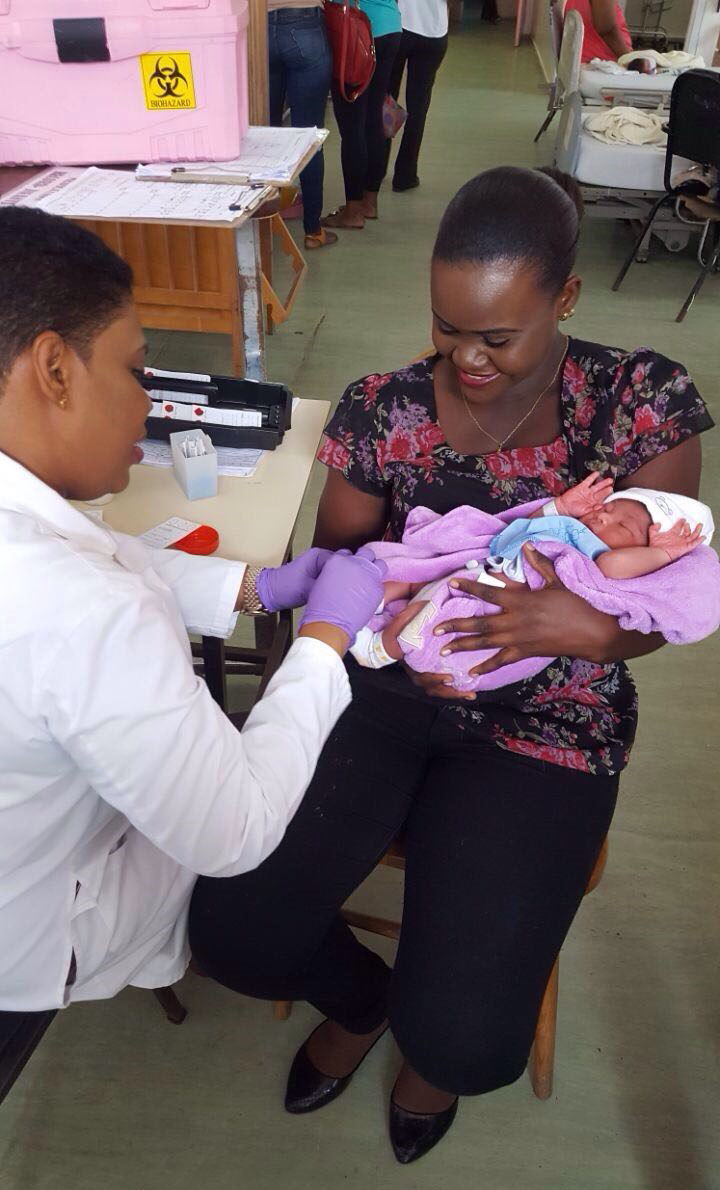Over the past year, 3,000 infants were screened for sickle cell anaemia and congenital hypothyroidism in a pilot project at the Georgetown Public Hospital (GPH).
The project, which was supported by the Guyana Bank of Trade and Industry (GBTI), has “provided valuable data and highlighted the need for continuous new-born screening in Guyana,” according to Dr Bibi Alladin-Karan, the project lead. Dr Alladin-Karan was assisted by Dr Mohamed Rambarran, a statement from GBTI said.
“It was the first new-born screening test to be done in Guyana with about 3,000 babies being screened at [the] GPHC post-natal ward over a one-year period. These babies were screened for congenital hypothyroidism and haemoglobinopathies. The data obtained provided baseline values for the Guyanese population and highlighted the importance of new-born screening,” Dr Alladin-Karan was quoted as saying.
The statement said that during the project, once the mother’s consent was given, samples were taken at the GPH, and then sent to the Children’s Health Eastern Ontario laboratory in Canada for the testing to be done. A sample only required a prick of the baby’s heel to extract a small drop of blood which was all that was required, it noted.
The project emerged after Dr Alladin-Karan, during her practice at the GPH paediatrics department, recognised that children were diagnosed with sickle cell anaemia and congenital hypothyroidism after they would have presented some clinical manifestations of the diseases.
Sickle cell anemia, according to the Mayo Clinic, is an inherited form of anaemia — a condition in which there aren’t enough healthy red blood cells to carry adequate oxygen throughout the body.
Congenital hypothyroidism (CHT), meanwhile, is a condition resulting from an absent or under-developed thyroid gland (dysgenesis) or one that has developed but cannot make thyroid hormone because of a ‘production line’ problem (dyshor-monogenesis). According to the British Thyroid Foundation, babies with CHT cannot produce enough thyroid hormone for the body’s needs. The term ‘congenital’ means that the condition is present at birth. Untreated, CHT can result in impaired brain development.
Meantime, the statement noted that babies born with the sickle cell trait are only expected to live to about the age of 25-30 years old if treatment is not administered. Babies born with the trait for congenital hypothyroidism could potentially develop mental disorders, limb and joint impairments and other such disabilities that can affect them as they grow and develop.
“These complications may be irreversible once diagnosed at a late stage and these children are then subjected to reduced quality of life and sometimes early death. But if these conditions can be diagnosed shortly after birth and therefore are closely monitored and followed, there could be better outcome for these children,” Dr Alladin-Karan emphasised.
The doctor expressed hope that the data collected will be used to develop a policy for the routine implementation of new-born screening in Guyana which will be feasible and sustainable with the support of the Ministry of Public Health, the Pan American Health organization and the GPH, the statement said.
GBTI noted that the estimated cost of the project was US$40,000 of which the bank financed a substantial amount for testing of samples. The GPH provided technical resources and transportation.
The statement observed that the United Nations has recognised the potential lethal complications associated with sickle cell anaemia and has urged member states to institute national programmes to effectively manage this condition as so to reduce its impact.
“One such programme is new-born screening which is done within a few days of birth to detect diseases which can be managed so as to improve outcomes. For this reason I along with Dr Mohamed Rambarran advocated for the introduction of new-born screening in Guyana. GBTI was approached for financial support and quickly committed,” Dr Alladin-Karan was quoted as saying.






